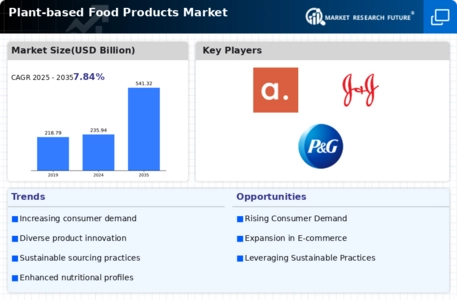-
PACIFIC PLANT-BASED FOOD PRODUCTS MARKET, BY Product Type
-
Overview
-
Non-Dairy Milk
-
Dairy Products
-
Bakery and Confectionery
-
Sweet and Savoury Snacks
-
RTE and RTC Meals
-
Others
-
ASIA PACIFIC PLANT-BASED FOOD PRODUCTS MARKET, by Category
-
Overview
-
Organic
-
Conventional
-
ASIA PACIFIC PLANT-BASED FOOD PRODUCTS MARKET, by
-
Distribution Channel
-
Overview
-
Store based
-
Non store based
-
ASIA PACIFIC PLANT-BASED
-
FOOD PRODUCTS MARKET, by Region
-
Overview
-
Asia-Pacific
-
China
-
Japan
-
India
-
Australia
-
South Korea
-
Indonesia
-
Thailand
-
Vietnam
-
Malaysia
-
Singapore
-
Rest of Asia-Pacific
-
Competitive Landscape
-
Overview
-
Competitive Analysis
-
Market Share Analysis
-
Major Growth Strategy in the ASIA PACIFIC Plant-based
-
Food Products Market,
-
Competitive
-
Benchmarking
-
Leading
-
Players in Terms of Number of Developments in the Asia Pacific Plant-based Food
-
Products Market,
-
Key
-
developments and Growth Strategies
-
New Product Launch/Service Deployment
-
Merger & Acquisitions
-
Joint Ventures
-
Major Players Financial
-
Matrix
-
Sales
-
& Operating Income, 2022
-
Major Players R&D Expenditure. 2022
-
Company ProfileS
-
ADM
-
Company Overview
-
Financial Overview
-
Products Offered
-
Key Developments
-
SWOT Analysis
-
Key Strategies
-
Wilmar International Ltd (2020)
-
Company Overview
-
Financial Overview
-
Products Offered
-
Key Developments
-
SWOT Analysis
-
Key Strategies
-
Emsland Group
-
Company Overview
-
Financial Overview
-
Products Offered
-
Key Developments
-
SWOT Analysis
-
Key Strategies
-
Cargill, Incorporated
-
Company Overview
-
Financial Overview
-
Products Offered
-
Key Developments
-
SWOT Analysis
-
Key Strategies
-
DuPont
-
Company Overview
-
Financial Overview
-
Products Offered
-
Key Developments
-
SWOT Analysis
-
Key Strategies
-
Ingredion
-
Company Overview
-
Financial Overview
-
Products Offered
-
Key Developments
-
SWOT Analysis
-
Key Strategies
-
ROQUETTE FRÈRES
-
Company Overview
-
Financial Overview
-
Products Offered
-
Key Developments
-
SWOT Analysis
-
Key Strategies
-
KERRY
-
Company Overview
-
Financial Overview
-
Products Offered
-
Key Developments
-
SWOT Analysis
-
Key Strategies
-
Burcon
-
Company Overview
-
Financial Overview
-
Products Offered
-
Key Developments
-
SWOT Analysis
-
Key Strategies
-
Shandong Jianyuan Group
-
Company Overview
-
Financial Overview
-
Products Offered
-
Key Developments
-
SWOT Analysis
-
Key Strategies
-
DSM
-
Company Overview
-
Financial Overview
-
Products Offered
-
Key Developments
-
SWOT Analysis
-
Key Strategies
-
Glanbia plc
-
Company Overview
-
Financial Overview
-
Products Offered
-
Key Developments
-
SWOT Analysis
-
Key Strategies
-
Prolupin GmbH
-
Company Overview
-
Financial Overview
-
Products Offered
-
Key Developments
-
SWOT Analysis
-
Key Strategies
-
ET CHEM
-
Company Overview
-
Financial Overview
-
Products Offered
-
Key Developments
-
SWOT Analysis
-
Key Strategies
-
The Green Labs LLC
-
Company Overview
-
Financial Overview
-
Products Offered
-
Key Developments
-
SWOT Analysis
-
Key Strategies
-
Axiom Foods, Inc.
-
Company Overview
-
Financial Overview
-
Products Offered
-
Key Developments
-
SWOT Analysis
-
Key Strategies
-
Yantai Shuangta Food
-
co., LTD
-
Company
-
Overview
-
Financial
-
Overview
-
Products
-
Offered
-
Key
-
Developments
-
SWOT
-
Analysis
-
Key
-
Strategies
-
Appendix
-
References
-
Related Reports
-
LIST OF TABLES
-
ASIA PACIFIC Plant-based
-
Food Products Market, Synopsis, 2024-2032
-
ASIA PACIFIC Plant-based Food Products Market, Estimates
-
& Forecast, 2024-2032 (USD BILLION)
-
ASIA PACIFIC PLANT-BASED FOOD PRODUCTS MARKET, BY Product
-
Type, 2024-2032 (USD BILLION)
-
ASIA PACIFIC PLANT-BASED FOOD PRODUCTS MARKET, BY Category, 2024-2032
-
(USD BILLION)
-
ASIA
-
PACIFIC PLANT-BASED FOOD PRODUCTS MARKET, by Distribution Channel, 2024-2032 (USD
-
BILLION)
-
china:
-
PLANT-BASED FOOD PRODUCTS MARKET, BY Product Type, 2024-2032 (USD BILLION)
-
china PLANT-BASED FOOD
-
PRODUCTS MARKET, BY Category, 2024-2032 (USD BILLION)
-
china: PLANT-BASED FOOD PRODUCTS MARKET, BY Distribution
-
Channel, 2024-2032 (USD BILLION)
-
japan: PLANT-BASED FOOD PRODUCTS MARKET, BY Product Type, 2024-2032
-
(USD BILLION)
-
japan
-
PLANT-BASED FOOD PRODUCTS MARKET, BY Category, 2024-2032 (USD BILLION)
-
japan: PLANT-BASED FOOD
-
PRODUCTS MARKET, BY Distribution Channel, 2024-2032 (USD BILLION)
-
india: PLANT-BASED FOOD PRODUCTS
-
MARKET, BY Product Type, 2024-2032 (USD BILLION)
-
india PLANT-BASED FOOD PRODUCTS MARKET, BY Category,
-
india: PLANT-BASED FOOD PRODUCTS MARKET, BY Distribution Channel, 2024-2032
-
(USD BILLION)
-
australia:
-
PLANT-BASED FOOD PRODUCTS MARKET, BY Product Type, 2024-2032 (USD BILLION)
-
australia PLANT-BASED
-
FOOD PRODUCTS MARKET, BY Category, 2024-2032 (USD BILLION)
-
australia: PLANT-BASED FOOD PRODUCTS MARKET, BY Distribution
-
Channel, 2024-2032 (USD BILLION)
-
south korea: PLANT-BASED FOOD PRODUCTS MARKET, BY Product Type, 2024-2032
-
(USD BILLION)
-
south
-
korea PLANT-BASED FOOD PRODUCTS MARKET, BY Category, 2024-2032 (USD BILLION)
-
south korea: PLANT-BASED
-
FOOD PRODUCTS MARKET, BY Distribution Channel, 2024-2032 (USD BILLION)
-
indonesia: PLANT-BASED
-
FOOD PRODUCTS MARKET, BY Product Type, 2024-2032 (USD BILLION)
-
indonesia PLANT-BASED FOOD PRODUCTS
-
MARKET, BY Category, 2024-2032 (USD BILLION)
-
indonesia: PLANT-BASED FOOD PRODUCTS MARKET, BY Distribution
-
Channel, 2024-2032 (USD BILLION)
-
thailand: PLANT-BASED FOOD PRODUCTS MARKET, BY Product Type, 2024-2032
-
(USD BILLION)
-
thailand
-
PLANT-BASED FOOD PRODUCTS MARKET, BY Category, 2024-2032 (USD BILLION)
-
thailand: PLANT-BASED
-
FOOD PRODUCTS MARKET, BY Distribution Channel, 2024-2032 (USD BILLION)
-
vietnam: PLANT-BASED
-
FOOD PRODUCTS MARKET, BY Product Type, 2024-2032 (USD BILLION)
-
vietnam PLANT-BASED FOOD PRODUCTS
-
MARKET, BY Category, 2024-2032 (USD BILLION)
-
vietnam: PLANT-BASED FOOD PRODUCTS MARKET, BY Distribution
-
Channel, 2024-2032 (USD BILLION)
-
malaysia: PLANT-BASED FOOD PRODUCTS MARKET, BY Product Type, 2024-2032
-
(USD BILLION)
-
malaysia
-
PLANT-BASED FOOD PRODUCTS MARKET, BY Category, 2024-2032 (USD BILLION)
-
malaysia: PLANT-BASED
-
FOOD PRODUCTS MARKET, BY Distribution Channel, 2024-2032 (USD BILLION)
-
Singapore: PLANT-BASED
-
FOOD PRODUCTS MARKET, BY Product Type, 2024-2032 (USD BILLION)
-
Singapore PLANT-BASED FOOD PRODUCTS
-
MARKET, BY Category, 2024-2032 (USD BILLION)
-
Singapore: PLANT-BASED FOOD PRODUCTS MARKET, BY Distribution
-
Channel, 2024-2032 (USD BILLION)
-
rest of asia-pacific: PLANT-BASED FOOD PRODUCTS MARKET, BY Product
-
Type, 2024-2032 (USD BILLION)
-
rest of asia-pacific PLANT-BASED FOOD PRODUCTS MARKET, BY Category,
-
REST OF ASIA-PACIFIC: PLANT-BASED FOOD PRODUCTS MARKET, BY Distribution
-
Channel, 2024-2032 (USD BILLION)
-
LIST OF FIGURES
-
Research Process
-
Market Structure for the ASIA PACIFIC Plant-based Food Products
-
Market
-
Market
-
Dynamics for the ASIA PACIFIC Plant-based Food Products Market
-
ASIA PACIFIC Plant-based Food
-
Products Market, Share (%), BY Product Type, 2021
-
ASIA PACIFIC Plant-based Food Products Market, Share
-
(%), BY Category, 2021
-
ASIA
-
PACIFIC Plant-based Food Products Market, Share (%), BY Distribution Channel, 2021
-
ASIA PACIFIC Plant-based
-
Food Products Market, Share (%), by Region, 2021
-
ADM: FINANCIAL OVERVIEW SNAPSHOT
-
ADM: SWOT ANALYSIS
-
WILMAR INTERNATIONAL
-
LTD (2020):FINANCIAL OVERVIEW SNAPSHOT
-
WILMAR INTERNATIONAL LTD (2020):SWOT ANALYSIS
-
Emsland Group:FINANCIAL
-
OVERVIEW SNAPSHOT
-
Emsland
-
Group:SWOT ANALYSIS
-
Cargill,
-
Incorporated: FINANCIAL OVERVIEW SNAPSHOT
-
Cargill, Incorporated:SWOT ANALYSIS
-
DuPont:FINANCIAL OVERVIEW SNAPSHOT
-
DuPont:SWOT ANALYSIS
-
Ingredion:FINANCIAL OVERVIEW
-
SNAPSHOT
-
Ingredion:SWOT
-
ANALYSIS
-
ROQUETTE
-
FRÈRES: FINANCIAL OVERVIEW SNAPSHOT
-
ROQUETTE FRÈRES: SWOT ANALYSIS
-
KERRY: FINANCIAL OVERVIEW SNAPSHOT
-
KERRY: SWOT ANALYSIS
-
Burcon: FINANCIAL OVERVIEW
-
SNAPSHOT
-
Burcon:
-
SWOT ANALYSIS
-
Shandong
-
Jianyuan Group: FINANCIAL OVERVIEW SNAPSHOT
-
Shandong Jianyuan Group: SWOT ANALYSIS
-
DSM: FINANCIAL OVERVIEW
-
SNAPSHOT
-
DSM:
-
SWOT ANALYSIS
-
Glanbia
-
plc: FINANCIAL OVERVIEW SNAPSHOT
-
Glanbia plc: SWOT ANALYSIS
-
Prolupin GmbH: FINANCIAL OVERVIEW SNAPSHOT
-
Prolupin GmbH: SWOT ANALYSIS
-
ET CHEM: FINANCIAL OVERVIEW
-
SNAPSHOT
-
ET
-
CHEM: SWOT ANALYSIS
-
The
-
Green Labs LLC: FINANCIAL OVERVIEW SNAPSHOT
-
The Green Labs LLC: SWOT ANALYSIS
-
Axiom Foods, Inc.: FINANCIAL
-
OVERVIEW SNAPSHOT
-
Axiom
-
Foods, Inc.: SWOT ANALYSIS
-
Yantai Shuangta Food co., LTD: FINANCIAL OVERVIEW SNAPSHOT
-
Yantai Shuangta Food
-
co., LTD: SWOT ANALYSIS









Leave a Comment